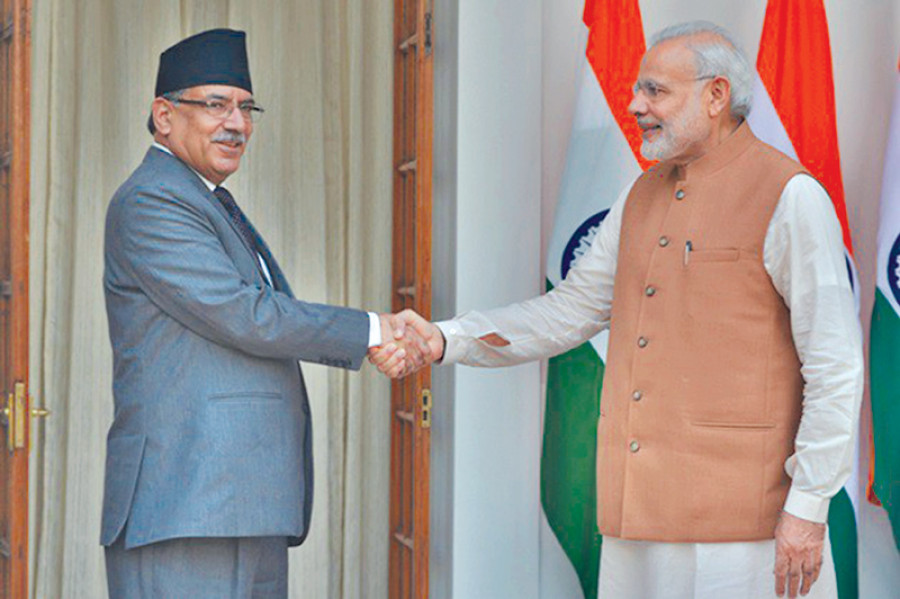Opinion
A routine visit
The fact that parties have different views on foreign policy makes Nepal more prone to international influence
Shyam Kc
Prime Minister Pushpa Kamal Dahal returned home on Sunday after what he termed a “successful” visit to India. His predecessor KP Oli, after his return from his visit to India in February, also termed his visit “highly successful”. “A successful visit” has invariably become a repeated theme song of our federal democratic republic’s prime ministers who religiously pay official visits to India. There have been eight—nine if a ‘technocratic’ government is to be counted—prime ministerships during the eight year period from 2008 to 2016: two from the Nepali Congress (Koiralas), three from the CPN-UML and three from the Maoist party (twice the same person).
Prime Minister Dahal, just before his first official visit to India in September 2008, was quoted as saying, “If India does not cooperate in the economic development of our country, we will not help in addressing the security concerns of India.” The Indian media have always been vocal in pointing out that the open Nepal-India border
“poses a serious security threat” to India because of “the influx of illegal arms, terrorists and counterfeit currency notes from Pakistan”.
As the open border is an issue of mutual concern, why our prime ministers who visit India do not make it a top priority is difficult to understand. For it poses not only perceived threats to India, but much more serious problems to Nepal, including security and long-term threats to its very existence. One can well imagine that this kind of thinking must not have escaped our leaders, especially when they are witnessing how political scenarios keep changing with time. There is no gainsaying that one day political demands for a separate and independent entity might surface. Our leaders of different hues must have taken all possibilities of this kind into consideration while formulating the country’s foreign policies.
Border follies
The fact that a foreigner is able to reach any part of this country and run their businesses or missions is something that cannot happen without making a dent in the employment and business opportunities for our own nationals. This has contributed to a massive outflow of youths from this country in search of jobs abroad. Nepali workers need proper paperwork and permits to work in foreign countries. In our own country, such permits do not seem to be necessary, although there must be legal provisions regarding this.
One need not have very sharp eyes to see the foreigners who have engaged themselves in various businesses in Nepal come primarily from our two neighbouring countries, India and China. The Indians, however, far outnumber the Chinese. From those making house-to-house sales even in remote hill and mountain villages to those running fairly large trading houses in the country, there are numerous Indians in this country who occupy jobs and other opportunities meant for Nepalis. The converse argument that there are many more Nepalis working in India than there are Indians in Nepal fails to take into account the population asymmetry of the two countries. Nepalis in India hardly make a difference in a country with over a billion people.
This lopsided situation seems to have stemmed from a worn-out treaty whose revision has remained hanging for years without any serious attempt by our past and present governments to genuinely seek its review. No attempt has been made so far to regulate the border and ensure its effective implementation. This would mean a requirement of proper documents for nationals of both countries to cross over to the other country. It should not and will not affect the social bonds that exist between the peoples of the two countries. However, such an arrangement would, to a large extent, help reduce the grievances of one country against the other because of the open border.
Eminent Persons Group
In the past, European countries colonised many nations in Asia and Africa because of their military prowess. But with the dawn of independence in many colonies, neo-colonialism has taken front stage. Neo-colonialism simply means replacing colonialism with a non-military takeover by influencing—some may say indoctrinating—the people.
The fact that Nepali political parties have their own views and perspectives on Nepal’s foreign policy makes the country more prone to international influence. There seems to be no continuity and the government of the day, even on vital matters like foreign policy, seems to be moulded according to the wishes of a few leaders. Dahal’s government, for instance, said it was continuing what the previous Oli government promised regarding support to India for a permanent seat at the UN Security Council. But then the same government had the very good sense to re-nominate a former ambassador to India who was recalled by the previous government. Where is the continuity in our foreign policy? No wonder the general public has misgivings about the way any government in Nepal functions. Does it function independently or at the behest of other countries?
In July, the Eminent Persons Group (EPG) from Nepal and India met and, according to media reports, agreed to review the controversial 1950 Nepal-India Peace and Friendship Treaty, which was signed at the crucially convenient time by the then prime minister Mohan Shumsher just prior to the end of the Rana oligarchy. The treaty was never the outcome of the 2007BS revolution and hence does not represent the wishes of the Nepali people. The EPG meeting, therefore, did the right thing by agreeing to review the treaty even though not all sides seemed to be enthusiastic about it. Unless the underlying basic aspirations of the people about the country’s foreign relations are addressed by the sitting prime minister, any official visit to the north or to the south will remain nothing more than a routine visit.




 15.12°C Kathmandu
15.12°C Kathmandu










